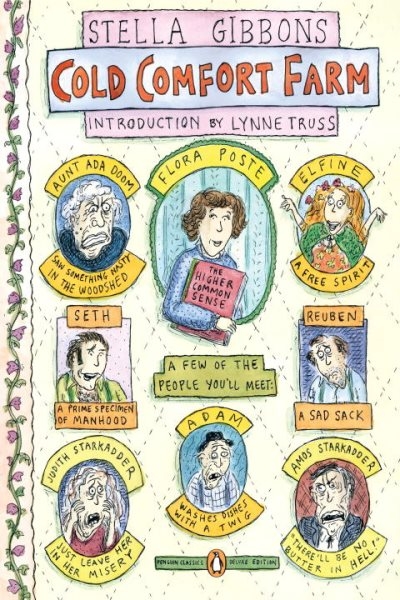
Stella Gibbons wrote 32 books over the course of her life, but she is most known for her first novel, Cold Comfort Farm (1932). Published in 1932, when Gibbons was still in her twenties, Cold Comfort Farm became wildly popular, received stellar reviews, and some very prestigious prizes. Gibbons would later say that the book ruined her career, overshadowing everything else she wrote afterwards.
Cold Comfort Farm is an astute cultural satire from beginning to end. The British class system, British literature, the Romantic tradition in art, the romanticization of rural settings, Freudian psychology, firebrand preachers, hunky heroes, and sensitive heroines—these are just a few of the things that Gibbons pokes fun at. She also parodies the literary style and tropes of such authors as D.H. Lawrence, Thomas Hardy, the Brontes, Jane Austen, Virginia Woolf, and the sentimental romance novels, replete with purple prose, which were popular during the early part of the twentieth century. You may find yourself laughing out loud while reading Cold Comfort Farm. I sure did. Repeatedly.
The plot is simple: a well-educated young woman, Flora Poste, is unable to support herself as she prefers after her parents' deaths. She likes the high life, unlimited flutes of champagne, dancing until dawn, her coterie of upper-crust friends, and can't be put upon to find a job. She decides to become a "parasite" and seeks out the support of various relatives, crossing off her list those that do not meet her standards. (She will not share a bedroom with anyone, including a parrot.) In the end, Flora chooses to move to a farm that is home to the extended family of her mother's sister, Aunt Ada Doom. To say that the farm and those who work and live there, including the cows, are memorable characters is an understatement. Flora decides to transform each and every one of them to suit her own tastes. How she achieves each transformation is what makes the book truly fun.
Stella Gibbons is a fascinating, witty, fearless author. Print runs of her other novels are in the works, and I hope to read at least a few, even if they turn out to be quite different than the brilliant Cold Comfort Farm. The woman can write!